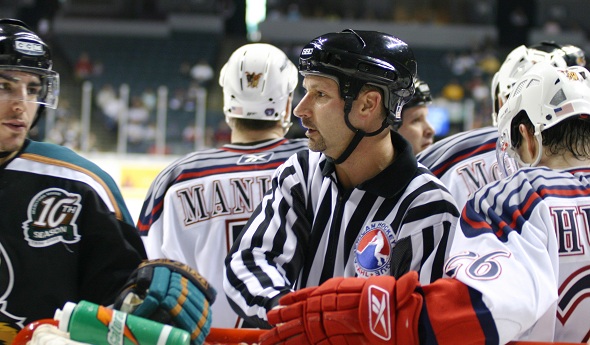
Garofalo: On-Ice Teacher and Recruiter
By
Rob Kaminski
MHSAA benchmarks editor
December 28, 2012
Something caught his eye as Allen Park’s Jim Garofalo circled the Olympic hockey rink in Salt Lake City to familiarize himself with the surroundings prior to the start of play at the 2002 Games.
“When the dimensions of a rink are laid out, everything is measured from the exact center of the ice outward,” Garofalo explains. “Usually there’s a washer or something small under the surface at center ice. All measurements are taken from there.
“Well, in Salt Lake City that year, a Canadian company was hired to prepare the sheets of ice, and they used a Loonie (common term for a Canadian $1 coin) to mark center ice. That year, the Canadians beat the United States in the gold medal game and won the Olympics on U.S. soil. I later visited the Hockey Hall of Fame in Toronto, and that Loonie is there.”
As Garofalo was getting acquainted with Canadian currency, an invitation in his mailbox back home went unanswered. At the time, MHSAA Tournament invitations were still sent by mail, so Garofalo was unaware the Association was awaiting his RSVP to accept his first Finals assignment.
“I was in Salt Lake City and had no idea. Now, of course, everything is online and by email, but that just shows how rapidly technology has progressed in the last 10 years,” Garofalo said. “So, (fellow official) Dan DiCristofaro calls and says something like, ‘Hey, do you want your state final?’ It was pretty funny; the running joke afterward was that you’ve gotta work the Olympics to get a shot at the state finals.”
Of course, that’s not the case. And, if Garofalo had it his way, all hockey officials who worked hard, persevered, paid their dues and set that as a goal would get a shot at the MHSAA Finals.
A 25-year registered MHSAA official who at one time juggled rules books for eight different hockey leagues and has worked four World Championships in addition to the Olympics, Garofalo now works only high school hockey.
“From a selfish standpoint, I suppose, I like a season that has a definite start and end to it,” says the New Boston Middle School social studies teacher, whose resume’ at one point looked like an endless Scrabble hand that included abbreviations for USA, USA Junior, Ontario, East Coast, International, International Independent and Central Collegiate hockey leagues in addition to the MHSAA.
“Being a teacher, there’s so much about the high school game that fits into education,” said Garofalo, now in his 10th year with the New Boston Huron District. “There’s so much to learn, and to help people learn at this level, from a playing and officiating standpoint.
“The people who officiate high school hockey are dedicated to improving, and as a veteran there’s an opportunity to help them learn and advance,” he says. “And, the coaches deserve kudos too. They are usually more professional and ask questions more properly than at other amateur levels. The reason is a direct result of them being accountable. They’ve got to answer to their principal or athletic director. Who are the junior and community league coaches accountable to? No one.”
 And, there’s another allure to the school game compared to which other levels pale.
And, there’s another allure to the school game compared to which other levels pale.
“The atmosphere of high school hockey is better than any other amateur level,” Garofalo says. “You go do a game at Trenton, and there’s a band. How many hockey games do you go to where there’s a band? Detroit Catholic Central and Birmingham Brother Rice have their cheering sections. It’s just a great atmosphere.”
It’s a scene that would surely help maintain the roster of younger, driven hockey officials. The trick is getting them there, according to Garofalo, one of the MHSAA’s biggest proponents for advancement and recruitment of officials.
Part of the issue is the oversaturation of games that fill Mite, Midget and other amateur schedules. Those who simply want a paycheck are never at a loss for work as long as they know how to skate.
“Hockey is unique because high school hockey is in progress at the same time as USA Hockey. An official can get twice the pay at a Bantam/Midget doubleheader than they can for one high school game,” Garofalo said. “The trouble is, who is instructing them? Who’s helping them to develop?”
To that end, Garofalo, DiCristofaro and the rest of the Northeast Hockey Referees Association established a $500 college scholarship. The recipient must be a high school hockey player who is officiating games in USA Hockey. Once they graduate from high school, many join the Association to work high school hockey.
Garofalo also offers other recruiting initiatives. In the Michigan Interscholastic Hockey League most schools play JV/Varsity doubleheaders, where the officials often let a linesman work a game at referee, while the experienced referee observes.
“At events like the Trenton Showcase, if we divide the fees differently we could get more officials involved,” he suggests. “We can do four-person crews to get our good young people some varsity experience as linesmen, and move some of our experienced linesmen to referee on the same crew with some of the top referees.”
It’s the kind of continual teaching that perpetuates the quality of officiating, and it takes time. The goal is to have the officials ready to perform when they hit the ice.
“If I put you out there to referee or pull lines, I set you up to succeed,” Garofalo says. “If I put people in too soon, I’ve set them up to fail, which leads to them leaving the game, and I haven’t done my job.”
The expectations and production of teacher and student must mesh for the system to work as intended. It requires patience as officials strive to climb the ladder, a bit of a lost art in today’s society.
“The culture of newer officials today is different. It’s a culture of immediate gratification,” says Garofalo. “Very few want to hang around eight to 10 years as a linesman before they referee, or move up. There are some very good officials who leave each year, because they haven’t become a referee, or haven’t got a tournament assignment.”
At the MHSAA Finals, Garofalo and DiCristofaro assist Jim Gagleard and the Livonia Ice Hockey Officials in heading up the off-ice officials. The inclusion and experience of such officials serves as a motivational tool which leads to improvement and retention. He also believes a four-person system in the MHSAA tournament would not only afford more qualified officials an opportunity for postseason assignments, but also provide better ice coverage as the sport’s speed has increased dramatically.
Not everyone can reach the summit, no matter the level. Even Garofalo himself, who once entertained dreams of skating in the NHL.
“The NHL looked at me a bit, but when I was at that age, it seemed all of the other linesmen were in their prime,” he said. “It is what it is.”
But, for a guy who began officiating at age 15 just to help pay for his hockey equipment, things have turned out quite well. In addition to the 2002 Olympics, Garofalo worked the Women’s World Championships in 1990, and the Men’s Worlds in Switzerland (1998), Norway (1999) and Germany (2001), working the Gold Medal game in 1998 and 1999. He’s been a fixture at the MHSAA tournament during the last dozen years.
“My wife, Mary Beth, says, ‘Wherever you go, you know someone.’ I owe that to officiating; the places I’ve gone and the people I’ve met,” Garofalo said. “It’s taken me all over the country instructing, and even overseas for some assignments. I can’t help but know people. It’s a people business.”
It might seem odd for Garofalo to even utter those words, describing the people-person this once shy kid has become. That’s one of the many rewards officiating delivers which is more valuable than any top-level assignment or game fee.
“I was quiet when I was younger. Well, when a coach is going crazy and yelling, you’ve got to speak for yourself. You learn conflict resolution,” Garofalo says, continuing as if he wrote the book on it. “‘Coach, get off the bench, quit screaming, and I’ll explain what I saw and why I called it the way I did. Then , if you have a question, I’ll answer it.’ You learn to communicate with people who don’t always agree with you.”
Then, there are the memories. Memories won’t buy a thing, but they go a long way in making 25 years on the ice, thousands of miles on the road, and countless hours away from home worth a million bucks.
“I worked 25 years for the IHL and AHL, and two years ago at the end of the regular season I was doing a Grand Rapids Griffins game. During the game, I told Brad May, ‘I’m done,’” Garofalo recalls, confiding in the gritty enforcer and one-time Stanley Cup champion who had more than 1,000 NHL games under his pads.
“At the end of the game, every guy and coach skated to me and shook my hand. Then Brad May says, ‘I heard you once worked the Olympics. It was an honor to be on the ice with you,’” Garofalo reveals, shaking his head. “Brad May said that to me.”
PHOTO: Jim Garofalo (center) officiate an NHL game. The Allen Park resident also has worked the Olympics.
NOTE: This is the sixth installment in the series "Making – and Answering – the Call" detailing the careers and service of MHSAA officials. Click the links below to view the others.
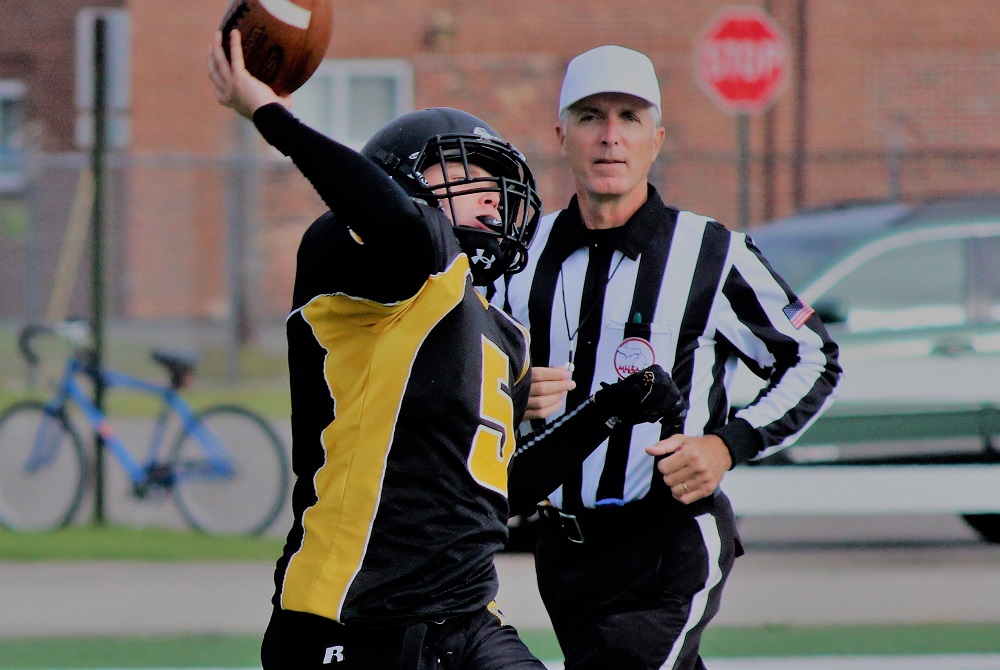
Official's List of 'Favorite' Sports Grows with Dedication to Making Our Games Go
By
Tom Spencer
Special for MHSAA.com
April 8, 2022
Any season. Any MHSAA sport.
 Well, almost any.
Well, almost any.
You name it, and likely Jeff Brunner has officiated it. He may even have been selected to officiate an MHSAA Final in the sport as well.
He first started as a baseball umpire right out of high school. Family and work life created a 20-year absence from officiating for the 1979 grad of Romeo High, where he had played baseball for the Bulldogs.
Brunner, a 20-year MHSAA registered official, is about to work his favorite sport – softball – again. But, the 60-year-old readily admits he loves games so much, the favorite sport can change regularly for him.
“It’s kind of whatever is in season,” Brunner said of naming a favorite. “I love the pace of the game of softball, and I am a big proponent of providing as may opportunities for girls to play sports, whatever that sport may be.
“For that reason I gravitated towards softball.”
He’ll have to wait though to get on the field. Both of his games were cancelled this week due to weather-related complications.
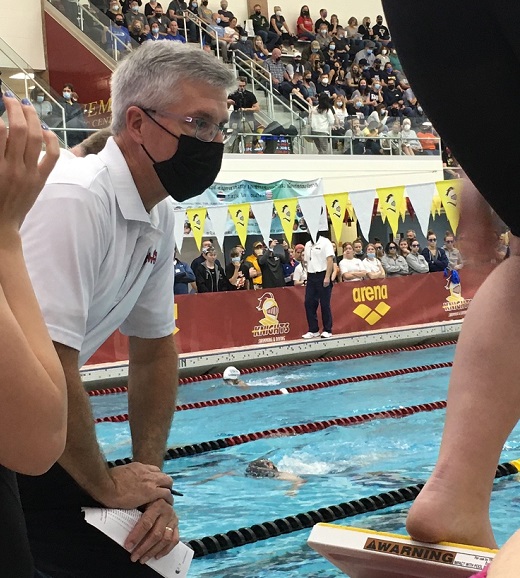 “Weather can create havoc with spring sports schedules – more so than any other season – so from an officiating standpoint, you have to count on some games being postponed or cancelled,” he acknowledged. “You just have to go with the flow and be ready to work when the weather allows.
“Weather can create havoc with spring sports schedules – more so than any other season – so from an officiating standpoint, you have to count on some games being postponed or cancelled,” he acknowledged. “You just have to go with the flow and be ready to work when the weather allows.
“I feel a bit bad for softball and baseball players in particular, because those seasons are so short to begin with, and every contest date is important,” he went on. “When bad weather causes cancellations as a result of rain or the extension of winter, it makes the high school season that much shorter for the athletes.”
Brunner, a father of four grown children, is currently registered for softball, football, volleyball, swimming & diving and basketball. He once did lacrosse in addition to starting his officiating career with baseball.
“There is only so much time in the week,” he said. “I can’t do everything.
“I have at least one sport for each of the three sporting seasons,” he continued. “It’s fun.”
Brunner watched his three daughters grow up playing softball and competing in swimming. His son played baseball and competed in swimming. They all graduated from Traverse City St. Francis, swimming through a co-op program. His daughters were all pitchers for the Gladiators. Their first pitching coach was Dad.
His youngest daughter, Julia, just finished competing for Wayne State University at the 2022 Division II Women’s Swimming & Diving Championships in Greensboro, N.C.
It was his kids that got him into officiating, along with the extra money. But today, it’s just to be a part of a game.
“We were always around sports,” Brunner said. “I thought about officiating for a while.
“Originally I did it to maybe earn just a little bit of extra money, get a little bit of exercise, and kind of stay close to the game,” he continued. “Now, it is just plain fun — it’s fun to be around a game, whatever that game is.”
During his officiating career, Brunner has been selected to officiate MHSAA Finals in swimming & diving and football. He’s not likely to get the chance to umpire a baseball or softball Final as his other business obligations interfere with MHSAA spring postseason play.
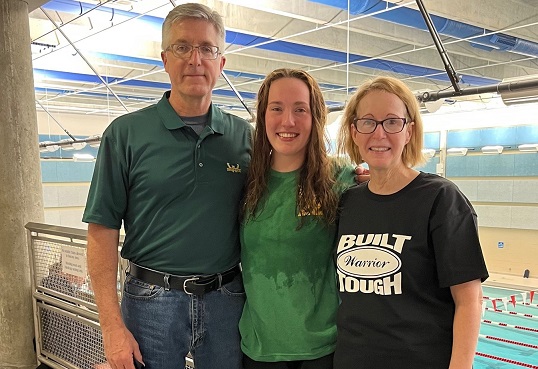 While working a Final is a goal of most all MHSAA officials, Brunner said it is just another game once it starts. He sees the Final as a great experience for all coaches, participants, fans and officials.
While working a Final is a goal of most all MHSAA officials, Brunner said it is just another game once it starts. He sees the Final as a great experience for all coaches, participants, fans and officials.
“MHSAA always does a great job of putting on a Final,” he said. “It’s always special.
“You have a few butterflies prior the game or the meet, but once things start you started focusing on the game itself.
The longer Brunner officiate, whatever the sport is, he believes the key to making the right call often comes down to mechanics.
“Mechanics were drilled into me when I first started,” Brunner said. “A lot of making the right call in my opinion is having the right mechanics and knowing where to be.
“You need to be in a good position to make the call.”
Many veteran coaches have noticed Brunner prides himself on being in the right position, and more. It is noted game after game, season after season.
“Jeff Brunner is the consummate professional as an umpire,” said Dave Kennedy, Traverse City West’s varsity softball coach. “He is excellent with his calls and positioning, but he is most concerned about getting the call right.
“Every time I see I have Jeff as part of the umpiring crew for my games, I know the game is going to be very well officiated,” Kennedy continued. “We are lucky to have Jeff as one of our officials in Northern Michigan — he’s definitely one of the best.”
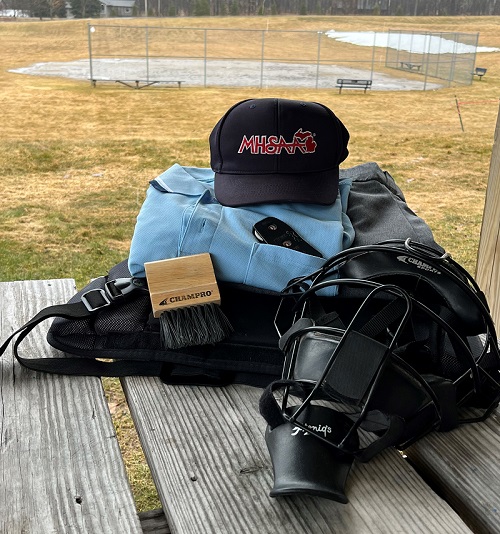 "As an umpire, Jeff's professionalism and easy demeanor are much appreciated,” Hawkins said. “He runs the games he works in such a way that the focus stays on the players.
"As an umpire, Jeff's professionalism and easy demeanor are much appreciated,” Hawkins said. “He runs the games he works in such a way that the focus stays on the players.
“Jeff may not know every player on the field personally, but I'm convinced that Jeff takes on his job, which is a difficult one, for them – the players."
Brunner and his son Andrew’s high school baseball experiences made it easy for Jeff to jump into baseball — and the same was true for softball due to his pitching girls. Swimming & diving, though, has been perhaps the most challenging sport to learn how to officiate for Brunner.
Watching his four children compete in pools over the years was a big help. The physical aspect was much easier, but maybe not the rules.
“The hard part is knowing all the rules … knowing what is a legal stroke and what is not,” he said. “It was an easy transition — we had seen so many swim meets.”
Today Brunner is anxiously waiting to get back on the softball field. He’s got his gear ready in anticipation of calling his first pitch of the 2022 season.
 Tom Spencer is a longtime MHSAA-registered basketball and soccer official, and former softball and baseball official, and he also has coached in the northern Lower Peninsula area. He previously has written for the Saginaw News, Bay County Sports Page and Midland Daily News. He can be reached at [email protected] with story ideas for Manistee, Wexford, Missaukee, Roscommon, Ogemaw, Iosco, Alcona, Oscoda, Crawford, Kalkaska, Grand Traverse, Benzie, Leelanau, Antrim, Otsego, Montmorency, Alpena, Presque Isle, Cheboygan, Charlevoix and Emmet counties.
Tom Spencer is a longtime MHSAA-registered basketball and soccer official, and former softball and baseball official, and he also has coached in the northern Lower Peninsula area. He previously has written for the Saginaw News, Bay County Sports Page and Midland Daily News. He can be reached at [email protected] with story ideas for Manistee, Wexford, Missaukee, Roscommon, Ogemaw, Iosco, Alcona, Oscoda, Crawford, Kalkaska, Grand Traverse, Benzie, Leelanau, Antrim, Otsego, Montmorency, Alpena, Presque Isle, Cheboygan, Charlevoix and Emmet counties.
PHOTOS (Top) Official Jeff Brunner has his eyes on the action while officiating a football game. (2) Brunner monitors a starting block during November’s MHSAA Lower Peninsula Division 3 Swimming & Diving Finals at Calvin University. (3) Brunner and his wife Michelle support daughter Julie at March’s Great Lakes Interscholastic Athletic Conference championship meet. (4) Brunner’s gear sits ready for his first game this week before it was canceled due to bad weather. (Photos courtesy of the Brunner family.)

